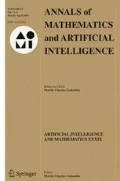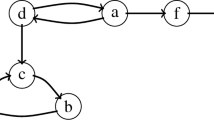Abstract
Argumentation is a reasoning model based on the construction of arguments and counter-arguments (or defeaters) followed by the selection of the most acceptable of them. In this paper, we refine the argumentation framework proposed by Dung by taking into account preference relations between arguments in order to integrate two complementary points of view on the concept of acceptability: acceptability based on the existence of direct counter-arguments and acceptability based on the existence of defenders. An argument is thus acceptable if it is preferred to its direct defeaters or if it is defended against its defeaters. This also refines previous works by Prakken and Sartor, by associating with each argument a notion of strength, while these authors embed preferences in the definition of the defeat relation. We propose a revised proof theory in terms of AND/OR trees, verifying if a given argument is acceptable, which better reflects the dialectical form of argumentation.
Similar content being viewed by others
References
L. Amgoud, Contribution a l'integration des préferences dans le raisonnement argumentatif, Thèse de doctorat de l'Université Paul Sabatier, Toulouse (July, 1999).
L. Amgoud and C. Cayrol, Integrating preference orderings into argument-based reasoning, in: Proceedings of the 1st International Joint Conference on Qualitative and Quantitative Practical Reasoning, ECSQARU-FAPR'97 (1997) pp. 159-170.
L. Amgoud and C. Cayrol, On the acceptability of arguments in preference-based argumentation framework, in: Proceedings of the 14th Conference on Uncertainty in Artificial Intelligence (1998) pp. 1-7.
L. Amgoud, C. Cayrol and D. LeBerre, Comparing arguments using preference orderings for argument-based reasoning, in: Proceedings of the 8th International Conference on Tools with Artificial Intelligence (1996) pp. 400-403.
L. Amgoud, N. Maudet and S. Parsons, Modelling dialogues using argumentation, in: Proceedings of the International Conference on Multi-Agent Systems, ICMAS'2000 (Boston, MA, 2000) pp. 31-38.
L. Amgoud and S. Parsons, A dialogue framework based on argumentation (2000). Submitted to J. Artif. Intell.
L. Amgoud, S. Parsons and N. Maudet, Arguments, dialogue, and negotiation, in: Proceedings of the 14th European Conference on Artificial Intelligence (2000) pp. 338-342.
L. Amgoud, S. Parsons and L. Perrussel, An argumentation framework based on contextual preferences, in: Proceedings of the International Conference on Formal and Applied and Practical Reasoning (2000) pp. 59-67.
C. Cayrol, V. Royer and C. Saurel, Management of preferences in Assumption-Based Reasoning, in: Lecture Notes in Computer Science, Vol. 682, eds. B. Bouchon-Meunier, L. Valverde and R.Y. Yager (1993) pp. 13-22.
P.M. Dung, On the acceptability of arguments and its fundamental role in non-monotonic reasoning and logic programming, in: Proceedings of the 13th International Joint Conference on Artificial Intelligence, IJCAI'93 (1993) pp. 852-857.
P.M. Dung, On the acceptability of arguments and its fundamental role in nonmonotonic reasoning, logic programming and n-person games, Artif. Intell. 77 (1995) 321-357.
M. Elvang, J. Fox and P. Krause, Dialectic reasoning with inconsistent information, in: Proceedings of the 9th Conference on Uncertainty in Artificial Intelligence (1993) pp. 114-121.
M. Elvang and A. Hunter, Argumentative logics: reasoning with classically inconsistent information, Data Knowledge Engrg. 12 (1995) 125-145.
J. Kohlas, R. Haenni and D. Berzati, Probabilistic argumentation systems and abduction, in: Proceedings of the 8th International Workshop on Non-Monotonic Reasoning, NMR'2000 (2000).
F. Lin and Y. Shoham, Argument systems-a uniform basis for non-monotonic reasoning, in: Proceedings of the first International Conference on Principles of Knowledge and Reasoning (1989) pp. 245-255.
G. Pinkas and R.P. Loui, Reasoning from inconsistency: a taxonomy of principles for resolving con-flicts, in: Proceedings of the 3rd International Conference on Principles of Knowledge representation and Reasoning (1992) pp. 709-719.
J.L. Pollock, How to reason defeasibly, J. Artif. Intell. 57 (1992) 1-42.
H. Prakken and G. Sartor, On the relation between legal language and legal argument: assumptions, applicability and dynamic priorities, in: Proceedings of the 8th International Conference on Artificial Intelligence and Law (1995) pp. 1-10.
H. Prakken and G. Sartor, A dialectical model of assessing conflicting arguments in legal reasoning, J. Artif. Intell. Law (1996) 331-368.
H. Prakken and G. Sartor, Argument-based extended logic programming with defeasible priorties, J. Appl. Non-Classical Logics 7 (1997) 25-75.
G.R. Simari and R.P. Loui, A mathematical treatment of defeasible reasoning and its implementation, J. Artif. Intell. 53 (1992) 125-157.
G. Vreeswijk, The feasibility of defeat in defeasible reasoning, in: Proceedings of the 2nd International Conference on Principles of Knowledge Representation and Reasoning, KR'91 (1991) pp. 526-534.
G. Vreeswijk, Abstract argumentation systems, J. Artif. Intell. 90 (1997) 225-279.
Author information
Authors and Affiliations
Rights and permissions
About this article
Cite this article
Amgoud, L., Cayrol, C. A Reasoning Model Based on the Production of Acceptable Arguments. Annals of Mathematics and Artificial Intelligence 34, 197–215 (2002). https://doi.org/10.1023/A:1014490210693
Issue Date:
DOI: https://doi.org/10.1023/A:1014490210693




